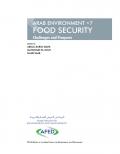Recent discussions on the green economy in Tunisia happened at an opportune moment. The country currently faces increasing unemployment as well as increasing social and spatial inequalities and energy and environmental challenges; these are all matters of growing concern. It is therefore clear that Tunisia needs a new development model.
In this context, ECA’s report on Inclusive green economy and structural transformation in Tunisia explores the links and contribution of inclusive green economy policies to structural transformation in Tunisia. Taking into account the historical, cultural and political backdrop of the country, the report highlights the challenges faced by Tunisia in developing its green economy, in structural transformation and in sustainable development. The report also identifies opportunities and makes recommendations. This report is only available in French.

This report presents a model that analyses fossil fuel subsidy reform across 20 countries showing an average reduction in national GHG emissions of 11% by 2020, and average annual government savings of USD 93 per tonne of CO2 abated. With a modest recycling of resources to renewables and energy efficiency, emissions reductions can be improved to an average of 18%. Some countries have included reforms in Intended Nationally Determined Contributions, toward a climate agreement. The report presents case studies from Morocco, Philippines and Jordan and was authored by the Global Subsidies Initiative of IISD, as part of the Nordic Prime Ministers’ green growth initiative.
This report provides a detailed diagnosis of the youth labour market in Tunisia, including a focus on vocational education and training and entrepreneurship, and within the context of Tunisia's transition to a green economy. The report takes an international comparative perspective, offering policy options to help improve school-to-work transitions. It also provides an opportunity for other countries to learn from the innovative measures that Tunisia has taken to strengthen the skills of youth and their employment outcomes.


Renewable energy together with energy efficiency, sustainable transport, sustainable agriculture, sustainable tourism, green building and waste management are economic sectors which are often considered capable of paving the way for a transition to a green economy and providing win-win solutions offering job creation, poverty alleviation and environmental protection. However, there are a number of obstacles and challenges that might inhibit these sectors in their contribution towards greening the economy. These include limited knowledge and awareness relevant to green economy and green jobs, gaps in policy and regulations, limited financial incentives to support green initiatives, and related awareness and skill shortages.
